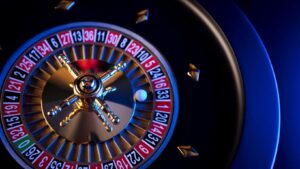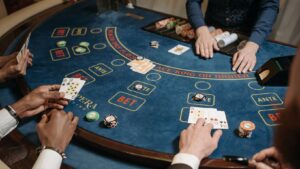Table of Contents
ToggleOccult Gambling History
In the rich tapestry of occult traditions, few elements are as persistently symbolic—and misunderstood—as games of chance. From ancient rituals of casting lots to the complex symbolism of tarot and the digital rituals of daily spins, the act of gambling holds deep esoteric meaning. Today, the same themes of chaos, fate, and synchronicity live on—not just in sacred texts, but in the surprising realm of social casino apps on the internet. Platforms like Sweepstakes Casino Sixty6 reflect this enduring fascination, offering gamified experiences that echo humanity’s timeless engagement with randomness and ritual. Exploring the occult gambling history from figures like Aleister Crowley to today’s algorithm-driven gaming platforms reveals how humanity’s fascination with randomness endures across mediums and millennia.
In ancient Roman taverns and public spaces, various dice and board games were popular forms of gambling and entertainment, including lotteries serving as early precursors to modern casinos and influencing their development. Alcohol was commonly available in these settings, contributing to the lively and sometimes rowdy atmosphere of gambling. Groups of people, such as pioneers and frontiersmen, later helped spread gambling games like poker across the country, especially in the American West. Gambling activities took place in many places, from Roman taverns to modern casinos in Las Vegas and online platforms. Women and children also participated in or were affected by gambling activities in ancient and historical contexts, such as Roman society.
The Ancient Roots of Chance and Divination
Long before Las Vegas or online slots, games of chance were sacred tools for divining the will of the gods—often personified as a gambling god or deities associated with games of chance. In Mesopotamia, astragalomancy—the casting of knucklebones—was used to interpret divine messages. Ancient Greeks used cleromancy to cast lots when seeking oracular guidance, while Egyptian priests interpreted dreams and dice throws as communication from the netherworld. Some of these ancient games of chance, such as Senet, were also used as a form of fortune telling to interpret divine signs and seek guidance from the gods.
These early acts of divination weren’t just games—they were bridges between the material and spiritual worlds. Gambling was a sacred ritual, not a pastime in our society, rooted in the belief that randomness was not random at all, but a whisper from higher realms. The origin of many gambling practices lies not in entertainment, but in ritualized chaos, meant to bring order or insight to complex decisions. Over time, tools like the tarot card evolved from simple gaming devices used in card games to powerful instruments of divination and fortune telling, further blurring the line between play and prophecy.
Aleister Crowley, the Tarot, and the Ritual of the Gamble

Aleister Crowley, the infamous British occultist and author of The Book of Thoth, is central to understanding the mystical evolution of gambling. His reinterpretation of the tarot deck was not merely symbolic—it was operational. Each card, laden with Kabbalistic and astrological significance, was a gateway into the psyche and the universe. Tarot cards have long been associated with divination, offering insight into a person’s future and the unfolding of fate, often in light of their choices. Today, modern tarot and Lenormand courses are designed to be accessible to beginners, making it easy for newcomers to start learning about these practices.
Crowley saw gambling not just as a leisure activity, but as an extension of magical will. He often played games of chance during magical workings, integrating them into rituals. For Crowley, the throw of a die or turn of a card was not left to chance—it was influenced by intention, alignment, and energy. He believed that to win in gambling was not simply a matter of luck, but a result of focused will and spiritual alignment. In this sense, the gambler could become the magician, bending probability toward an envisioned outcome.
This interpretation of tarot, especially as it evolved into gaming mechanics, has lingered in both occult and gaming subcultures. The symbology of fortune, chaos, and self-reflection survives today, not only in esoteric practice but in the gamified experiences that echo it.
The Symbolic System of Cards and Dice in Occult Traditions
The evolution from tarot to modern playing cards reflects a symbolic continuity often ignored in mainstream culture. Suits—hearts, diamonds, spades, clubs—mirror the cups, coins, swords, and wands of the tarot’s minor arcana. Court cards retain their regal symbolism, while the Joker, derived from the Fool, becomes the archetype of chaos and rebirth. The extent to which occult symbolism has influenced not only traditional card and dice games but also modern gaming forms, including video games and online platforms, demonstrates how deeply these esoteric elements are embedded across different genres and mediums.
Dice, too, hold ancient esoteric weight. In Hermeticism and Rosicrucianism, they were seen as expressions of divine randomness—elements through which the unknown revealed itself. The cube, with its six equal faces, symbolized balance, symmetry, and the unpredictability of fate.
These elements weren’t merely used—they were contemplated. A roll of the dice or a shuffled deck wasn’t about winning or losing; it was about interpreting what the outcome meant within a larger cosmological or psychological context. For example, historical and mythological examples such as the casting of lots in the Bible or the game of dice in the Mahabharata illustrate how cards and dice were used to reveal hidden truths or guide important decisions, showing their role as more than mere gaming tools. While symbolic interpretations offer layers of meaning, the reality is that in gambling, outcomes are governed by predetermined odds, not mystical forces.
Ritual, Pattern, and Synchronicity in Games of Chance
Swiss psychologist Carl Jung popularized the idea of synchronicity—meaningful coincidences that defy logical explanation. In the realm of the occult, this concept bridges easily to gambling for new people looking for luck . For many mystics and spiritualists, a “lucky” number appearing repeatedly is more than chance—it’s a message.
In social casino games, these rituals persist. Users have personal habits: they log in at specific times, choose certain machines, or respond to signs before spinning. Players may simultaneously engage in personal rituals and digital habits, mirroring ancient practices and modern behaviors at the same time. This player behavior, both in ancient and modern gambling, reflects a search for meaning and control over chance.
The digital environment has not removed ritual; it has simply reinvented it. The spin button has replaced the bone toss, and the daily bonus wheel has taken the place of the sacred casting lot.
Social Casinos as Digital Magic Circles

In his foundational work Homo Ludens, historian Johan Huizinga introduced the idea of the “magic circle”—a boundary where normal rules are suspended, and new ones emerge. Social casinos are, in many ways, digital magic circles. Within them, players enter a symbolic world of glowing wheels, enchanted coins, and seductive jackpots.
These spaces are intentionally designed to replicate reward systems that mimic sacred play. Players are rewarded for consistency, blessed with “free” spins, and initiated into escalating levels of symbolic achievement. The system rewards loyalty and punishes inaction—not unlike spiritual systems that promote discipline and sacrifice for eventual transcendence.
What makes social casino apps particularly fascinating in the context of occult gambling history is how they abstract traditional value. In these apps, users gamble not for money, but for virtual coins, streaks, and rankings—modern forms of symbolic capital. Some virtual casino communities appear prosperous, with players accumulating wealth and status before risking it all. Virtual items or tokens are often sold to players, mirroring the sale of lottery tickets in traditional gambling. The use of tickets in both historical lotteries and modern digital raffles or events within social casino apps highlights the longstanding connection between games of chance and fundraising for public or social causes. These tokens serve no material purpose but are imbued with value through ritual use.
Addiction, Illusion, and the Trickster Archetype
Within every mystic system lies the Trickster—a disruptive force that brings wisdom through chaos. Figures like Hermes, Loki, and the Fool represent both divine insight and devastating illusion. Gambling, historically, channels this energy. It seduces with promise and punishes with unpredictability. There are tragic stories of gamblers who ended up dead, their lives cut short by addiction and despair.
The same duality exists in social casino games. While they offer lighthearted fun, they also deploy deeply psychological tricks. Variable reward schedules, near-misses, and flashing animations keep players engaged through engineered anticipation. These systems are designed to create the illusion of winners, even though the odds are structured so that most players will lose, reinforcing the Trickster’s lesson about the deceptive nature of luck and success. These systems echo the Trickster’s role: offering lessons in attachment, illusion, and the nature of desire. Gambling can negatively impact the lives of individuals and their families, leading to broken relationships, financial ruin, and even crime. The lack of security in gambling environments can further contribute to instability and harm within communities.
As with ancient gamblers, modern players must ask—are they seeking luck, or are they being played by a greater force, algorithmic or archetypal, especially for the poor in society ?
Is Modern Virtual Gambling a New Form of Digital Alchemy?
Alchemy was never just about turning lead into gold—it was about spiritual transformation. In social casino apps, there’s an uncanny echo of this quest on this course. Time is transmuted into coins, coins into status, and status into emotional highs. Yet none of this exists beyond the screen.
The illusion of transformation is powerful, and it draws from ancient magical thinking: the belief that engagement with symbols can yield change. Virtual coins feel real, not because they have intrinsic value, but because they’re embedded within a reward structure that replicates spiritual progress. However, the net outcome for most players is often a net loss, as the rewards rarely translate into tangible gains. These platforms are adept at creating a sense of achievement and progress, even though the rewards are purely symbolic. Players ascend levels, unlock secrets, and pursue elusive jackpots—just as mystics sought the Philosopher’s Stone.
Many social casino apps incorporate RPG elements, allowing players to take on roles, progress through levels, and experience immersive narratives similar to classic role-playing games. Additionally, videos are frequently used within these apps to enhance engagement, offering tutorials, entertainment, and personalized content to keep players invested.
From Sacred Play to Casual Spin: The Decline or Evolution of Spiritual Risk?
Have we lost the sacred nature of games of chance—or simply adapted it?
While ancient rituals framed gambling as a communion with the unknown, today’s social casinos wrap the same structure in neon and dopamine. Yet the symbolic mechanisms remain. We still seek meaning in randomness, still ritualize our interaction with fate, and still place emotional bets on outcomes we can’t control.
Over time, politicians and governments have played a significant role in shaping the evolution of gambling through regulation and legislation. From the early laws passed by Caribbean nations to the oversight of lotteries in the Netherlands and the regulation of gambling in various U.S. states, these authorities have sought to control, tax, and address the social impacts of gambling.
There is also an ongoing moral and spiritual debate about whether gambling belongs to the kingdom of darkness or if it can ever be compatible with spiritual values. Many argue that gambling stands in opposition to the principles of God’s kingdom.
Open talk and discussion about the risks and consequences of gambling are essential. By sharing experiences and lessons, individuals and communities can better understand and address the challenges associated with gambling.
Perhaps the real shift is not in the game, but in our awareness of what it represents. By reclaiming the symbolic and esoteric roots of games of chance, even casual players might rediscover the deeper human quest for pattern, mystery, and meaning. Discover the hidden connections between ancient rituals and modern gaming experiences.
Beyond the Odds—The Eternal Dance of Chaos and Meaning
The occult gambling history stretching from ancient oracles to Aleister Crowley to modern social casino apps reminds us that gambling has always been more than recreation. It is a form of spiritual play on earth —a liminal act that dances with uncertainty, desire, and the divine. Social casino platforms may seem like mere entertainment, but they participate in an ancient tradition of symbolic engagement with fate.
Whether casting lots, shuffling tarot cards, or tapping for a daily spin, humans continue to explore the unknown through systems of chance. The world’s first commercial board game, the Ouija board, marked a significant moment in the history of occult gaming, bridging the gap between the known and the mysterious. In every roll, flip, and spin, we seek to glimpse the infinite behind the algorithm. The word and teachings from sacred texts have long influenced attitudes toward gambling, offering guidance on moral decisions even when specific practices are not directly addressed. Yet, the outcomes of these games can profoundly affect a person’s life, shaping their experiences, choices, and sense of meaning.




